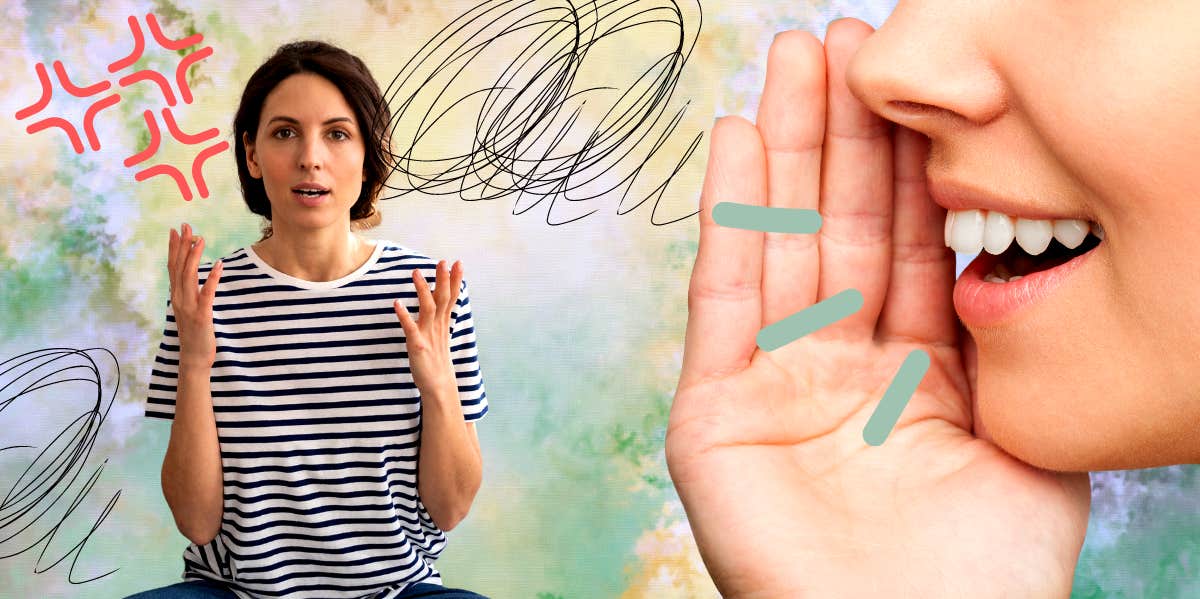
Seriously? That's what I sound like?
By Deauna Roane — Last updated on Apr 12, 2023
Photo: nkbimages / Getty Images and Billion Photos, dimabberlinphotos via Canva

If you can't watch a video of yourself speaking without mentally cringing, you're not alone.
You've probably noticed that the way you sound on film is vastly different from what you've grown accustomed to hearing. No matter how many times you replay that video, the single thought running through your mind is whether or not your voice really sounds like that, and if so, yikes.
But fear not. There's a scientific reason why your perception of your voice differs from what everyone else hears. (Hint: it has nothing to do with your vocal cords.)
RELATED: Your Tone Of Voice Can Predict How Long Your Relationship Will Last
Why do we hate our own voice?
Your brain translates audio differently than the sound you hear when you speak.
The first reason people tend to hate their own voice is due to a thing called “air conduction." Air conduction is when your body uses the apparatus of the ear to amplify and direct the sound. So when sound travels, it uses both the eardrum and the little bones within our skull.
When people hear a sound from others, that sound vibrates the eardrum and stimulates signals to the brain. But when we speak, the sound of our own voice travels through the ear bones, in our skull to our inner ear, causing the sound to be different than when we are hearing a recording of it.
"It's all about how sound waves travel to your ears. When you hear your own voice on a recording, you're only hearing sound through air conduction. That's when sound strikes the ear drum, which starts vibrating. Those sound vibrations travel to the inner ear and continue up to the brain," Pamela Kirkland adds.
Kirkland goes on to say that "the acoustics in your skull lower the frequency of those vibrations along the way, essentially adding in base tones."
It's interesting to note that your body adds other vibrations and sounds to your voice, making it seem lower than it actually is. Because of this, people find their voice to be higher and even squeakier when heard on a recording rather than at a lower frequency when they speak.
So the issue is the difference between air conduction and bone conduction. Each has its own way of manipulating sound.
You're struck with the reality of how you sound vs. how you perceive your own voice.
Another reason people hate the sound of their own voice is because it seems like a new voice entirely, one that sounds completely different than what they identify with. This can be discerning to many, causing an identity crisis within them.
Your recorded voice sounds entirely different from your speaking voice to you. It's like an entirely new person speaking which can be, well... frightening.
Listening to your voice on a recording causes you to confront a difference or disconnect between self-perception and reality. This is called voice confrontation.
In a 2005 study, participants who had voice problems rated their own voices when given audio recordings of them. The study proved that the participants rated negatively for the quality of their recorded voice compared with the objective assessments of clinicians.
This also shows that we are our biggest critics.
How To Deal With Hating Your Own Voice
Most people hate the sound of their own voice, so remember that you aren't alone in being unable to listen to yourself speak. However, there are a few things you can do to deal with it. After all, it's your only voice, so you can't hide from it forever,
Related Stories From YourTango:
One thing to try is diaphragmatic breathing, which can help you control the cadence and depth of your voice. To do this, simply engage the diaphragm while breathing which will, in turn, grant you more air to make your voice sound richer.
Another remedy is to just focus on what you say instead of how you sound. And, if all else fails, remember that you were made the way you were for a reason, so embrace all the uniqueness and quirks of your voice.
RELATED: What It Means If You're In The 30% Of People With A Very Unique Mind Quirk
More for You:
Deauna Roane is an associate editor for YourTango who covers pop culture, lifestyle, astrology, and relationship topics. She's had bylines in Emerson College's literary magazine, Generic and MSN.
